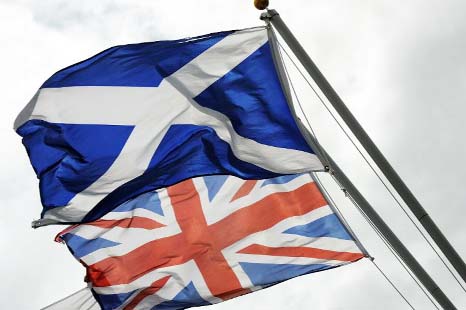
AFP, London :
The pro-independence Scottish National Party is set to dominate Scotland in the United Kingdom general election in May, according to a poll out Saturday, potentially giving it the balance of power.
The ICM poll in The Guardian newspaper put the SNP, which wants Scotland to leave the UK, on 43 percent, which, if reflected at the ballot box, could leave the left-wing party as kingmakers in the London parliament.
It could also severely dent the centre-left opposition Labour Party’s hopes of overtaking Prime Minister David Cameron’s Conservatives and returning to power in the May general election.
The online poll of 1,004 adults put the SNP on 43 percent (up from 20 percent in the 2010 general election) in Scotland, with Labour on 26 percent (down 16 percent). Cameron’s centre-right Tories were on 13 percent (down four), with their centrist Liberal Democrat coalition partners on six percent (down 13).
The SNP’s membership has more than tripled to 90,000 since the September 18 referendum on Scottish independence, when 55 percent of Scots voted to remain part of the UK.
“We are prospectively looking at the collapse of citadels that have always been Labour since the 1920s,” said Professor John Curtice of Strathclyde University.
“It is becoming clear that the independence referendum has reset all the dials,” the electoral behaviour expert told The Guardian, calling it “the political transformation of a nation”.
The SNP won six of Scotland’s 59 seats in the 650-member British parliament at the last general election in 2010, while Labour won 41.
The ICM poll would give the SNP 45 seats and Labour 10, on a uniform swing.
The pro-independence Scottish National Party is set to dominate Scotland in the United Kingdom general election in May, according to a poll out Saturday, potentially giving it the balance of power.
The ICM poll in The Guardian newspaper put the SNP, which wants Scotland to leave the UK, on 43 percent, which, if reflected at the ballot box, could leave the left-wing party as kingmakers in the London parliament.
It could also severely dent the centre-left opposition Labour Party’s hopes of overtaking Prime Minister David Cameron’s Conservatives and returning to power in the May general election.
The online poll of 1,004 adults put the SNP on 43 percent (up from 20 percent in the 2010 general election) in Scotland, with Labour on 26 percent (down 16 percent). Cameron’s centre-right Tories were on 13 percent (down four), with their centrist Liberal Democrat coalition partners on six percent (down 13).
The SNP’s membership has more than tripled to 90,000 since the September 18 referendum on Scottish independence, when 55 percent of Scots voted to remain part of the UK.
“We are prospectively looking at the collapse of citadels that have always been Labour since the 1920s,” said Professor John Curtice of Strathclyde University.
“It is becoming clear that the independence referendum has reset all the dials,” the electoral behaviour expert told The Guardian, calling it “the political transformation of a nation”.
The SNP won six of Scotland’s 59 seats in the 650-member British parliament at the last general election in 2010, while Labour won 41.
The ICM poll would give the SNP 45 seats and Labour 10, on a uniform swing.

